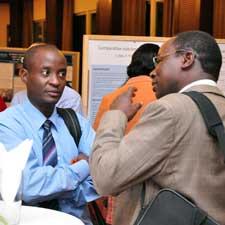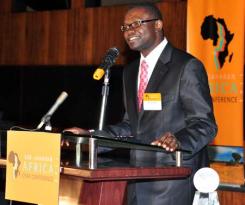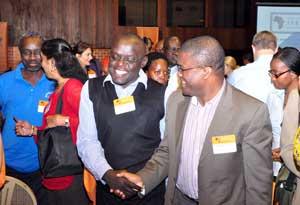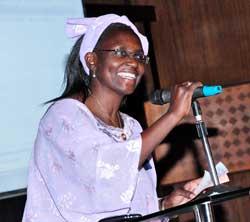Conference Report
The 2011 Sub-Saharan Africa CFAR Conference took place on May 26-27, 2011 in Kampala, Uganda. This inaugural meeting was conceptualized and planned through a joint U.S.-African Steering Committee, in conjunction with all 21 CFARs.
Conference Goals
- Feature research conducted by African investigators affiliated with CFAR;
- Identify resources and infrastructure available to support collaborative AIDS research and training in Africa;
- Facilitate new collaborations among African institutions and their CFAR partners.
Conference Themes
To achieve the conference goals, the Steering Committee designed a program based on initial survey input and ongoing feedback from African CFAR partners. The program combined a series of plenary and poster presentations, panel discussions, and breakout groups focusing on three themes of greatest priority to Sub-Saharan Africa:
- Integrating Treatment and Prevention in HIV Care
- HIV Co-Morbidities (focusing on tuberculosis and AIDS malignancies)
- HIV and Women

Conference Program, Abstracts, and Poster Session
A critical element and unifying thread throughout the program was to feature research conducted at CFAR-affiliated institutions in Africa from various scientific perspectives -- i.e., basic science, clinical, and operational research. Another priority emphasis in development was to engage junior investigators from Africa.
A total of two keynotes, 4 plenary talks, and 15 panel presentations were featured in the program (including 16 African speakers). In response to to a call for abstracts, 44 scientific abstracts covering the three conference themes were received and printed in the program book. The final plenary session featured six junior scientists from Uganda, Kenya, and Zambia, whose abstracts were selected by the Steering Committee from the abstract pool.
The majority of the submitted abstracts were also presented as posters during the conference. In addition to showcasing the research being conducted at CFAR partner African sites and other institutions in Sub-Saharan Africa, the Poster Session provided an interactive forum for the exchange of information on institutional activities and resources supporting research and training in Africa -- a critical prerequisite for capacity building and the fostering of new collaborations among African institutions. A total of 34 African and North American institutions and networks presented posters in this section.
Breakout Sessions
The program included breakout group discussions based on the conference themes as well as on cross-cutting topics of interest. These sessions provided an opportunity for participants to engage with colleagues with similar scientific interests, identify challenges and opportunities across the region, and begin to explore potential ideas for collaboration in both research and training. A secondary goal was to consider strengths and gaps (in personnel, infrastructure, equipment, etc.) at each institution and brainstorm about ways to share resources in order to address some of these gaps and to build capacity in the region. Breakout topics included:
- Study Design, Data Analysis, and Biostatistics
- Specimen Collection and Storage
- ARV Resistance and Clinical Management Issues
- HIV Pathogenesis
- HIV and Women
- HIV/Tuberculosis Co-infection
- AIDS Malignancies
- Moving Research into Policy and Practice
- Training and Leadership Development/Mentoring Panel
Pre-Conference Workshop
A pre-conference workshop on Manuscript Writing, targeting junior and mid-level investigators from Africa, was developed by faculty from the UCSF and UNC CFARs. An integral part of the workshop agenda was the public review of manuscript drafts submitted by several trainees, followed by further discussion and analysis in small breakout groups, led by African and U.S. mentors. Several of the trainees continued to work on their draft manuscripts and received additional feedback from their mentors throughout the course of the 2-day conference. The training and mentorship components were enthusiastically received, with participation by fully one-third of the conference attendees. Many trainees judged it as the most practically valuable session of the program and look forward to having more of such training opportunities in the future.
Merle Sande Leadership Lecture

Dr. Christian Happi of the University of Ibadan, Nigeria, recipient of the Accordia Foundation's 2011 Merle A. Sande Leadership Award,
This pre-conference event was sponsored by The Accordia Foundation, whose mission is to strengthen healthcare capacity and academic medical institutions in Africa to overcome the burden of infectious diseases. The lecture was introduced by U.S. Ambassador Jerry Lanier and featured the recipient of the Accordia Foundation's 2011 Merle A. Sande Leadership Award, Dr. Christian Happi of the University of Ibadan, Nigeria. The award is given annually to an emerging African leader who has contributed to the field of infectious disease in Africa, and who embodies the intellectual drive and spirit of Dr. Merle Sande, founder of Accordia. Dr. Happi provided an overview of his study of the molecular basis for drug resistance of the malaria-carrying Plasmodium falciparum. He also emphasized the need for continued capacity building and support of African junior investigators.
Conference Attendance
Early in the conference planning process, the Conference Steering Committee agreed to aim for African representation that would approach a ratio of 3-to-1 for both speakers and audience (African to U.S.). Another priority was to ensure strong participation by junior investigators from Africa. To facilitate these goals and to promote networking primarily among Africans, attendance was limited to delegations nominated and supported by individual CFARs (and other NIH-supported networks) as well as external African investigators, space permitting.

As a result of structuring the target audience, the conference succeeded in bringing together a total of 234 registrants (223 attendees due to last-minute cancellations) -- 146 (63%) of whom were from 13 countries of Sub-Saharan Africa. A remarkable 77 (50%) of these were junior investigators -- which alone speaks to a successful conference outcome! Such strong representation was made possible thanks to both individual CFAR sponsorship and critical funding support provided by the NIH's Office of AIDS Research and the Office of the Global AIDS Coordinator (PEPFAR), which included 35 travel scholarships for junior investigators from Africa.
Overall, conference participants included representatives from:
- 19 CFARs and U.S. universities
- 25 African universities and research institutes
- 9 clinical centers/hospitals
- 10 NGOs
- 7 Ministry of Health/Government agencies (including NIH)
In addition to the CFARs, other represented networks included:
- AIDS Malignancy Consortium (AMC)
- International Epidemiologic Databases to Evaluate AIDS (IeDEA)
- HIV Prevention Trials Network (HPTN)
- Medical Education Partnership Initiative (MEPI)
The active participation by such a diverse group of attendees furthered the meeting goal of expanding opportunities for trans-network dialogue and South-South collaborations in Africa on key priority issues related to HIV/AIDS.
Conference Outcomes

Working Groups
The breakout sessions led to productive discussion and the identification of several ideas for potential collaborative projects and follow-up by several working groups. It is anticipated that, as a minimum, listserves will be established in order for these working groups to maintain a communication link.
- HIV and Women
- HIV/Tuberculosis Co-infection
- ARV Resistance/Clinical Management Issues
It is envisioned that the interactions and momentum begun at the conference will lead to the emergence of an African-led network that will build on existing collaborations and continue to explore potential synergies with new partners -- including other complementary networks active in Africa and, in particular, South-South partnerships among African institutions. The conference organizers will explore the creation of a platform through an online blog on this website for ongoing dialogue among all conference participants and the emerging network.
Inventory of African Institutional Resources
In response to input received during the conference planning process, the Steering Committee developed a survey and collected information on each participating institution's resources that support HIV-related research and training in Sub-Saharan Africa -- such as available lab resources, biological specimen repositories, specific clinical cohorts, data management and biostatistician support, and current training and post-graduate education initiatives. The input received was synthesized and used to develop resource maps, featuring 27 African and 13 North American institutions. The data will continue to be refined into an Inventory of Institutional Resources for Sub-Saharan Africa, as more information becomes available in the future. This online resource will greatly facilitate the development of new collaborations across African institutions, and further the emergence of South-South research and training networks.
Conference Evaluation
Based on immediate participant feedback, the meeting was an unqualified success, with active engagement and lively participation by the audience. Participants were lined up 10-deep at the audience microphones to share comments and ask questions during each of the session panel discussions.
The online evaluation results show that nearly 98% of respondents were "satisfied" or "very satisfied" with the conference. Evaluation input received related to the individual sessions will be an invaluable resource for planning future meetings of this network.
Sub-Saharan Africa CFAR Conference Host Rotation
Due to the success of the Kampala conference, it is anticipated that this meeting will become only the first of biannual CFAR conferences of the new trans-national African network. Several CFARs have expressed interest in hosting the next conference in 2013, in collaboration with their African partners.